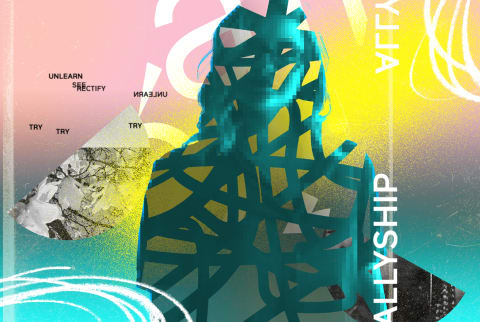One of the best ways to understand what this looks like is by considering the idea of allyship. Many people have taken to labeling themselves an “ally” to Black people in recent weeks. We also commonly see the language in reference to supporting the LGBTQ+ community, with people referring to themselves as “allies” to queer people. Being an ally is a label. Acting in allyship is about actions—it’s about what you’re actually, tangibly doing to support the people in question. When you’re not doing the actions (such as working to heal your internalized racism, confronting friends and family members when they make racist comments, donating to organizations fighting for racial justice, or creating more racial equity in your workplace), you’re not currently being an ally. Because of this, there’s no person who simply is an ally through and through. Allyship is something you do, whether it’s rarely, sometimes, or over and over constantly. “This is really important—it’s a choice you make all the time. It’s a choice you’re making in every moment. And you can actively choose not to make that choice,” Ricketts explained. “I can’t actively choose not to be black. I am black. You are only acting in allyship.” “You’re going to fuck it up. You’re never going to be an ally 24/7,” Ricketts pointed out. “Even white folks who I love and who love me, and there are tons that are doing this work…they fuck it up. My expectation is not perfection.” Ricketts said that even she fails to be an ally to every marginalized group at all times, but what matters is how you acknowledge and address those failures when they happen: “I’m going to fuck it up. But I can do my best to unlearn what I’ve learned, to educate myself appropriately, and to act in allyship as much as possible, and to rectify harms when I cause them—because I will cause them—and try better moving forward. That’s the best-case scenario.” The goal is to make the choice to act in allyship in the moment, every time the moment arises. We all will at times slip up, lose focus, make mistakes, and then must recommit ourselves to doing better going forward. But we won’t be able to do better going forward until we’re able to hold ourselves accountable for when we choose not to help the people we’re wanting to help. Labeling ourselves as an ally gives us credit regardless of what we actually do. Without the label, we are compelled to truly act out our allyship—it’s something only our actions can prove. When we aren’t doing the actions, we aren’t allies. So the real goal is to be able to do these actions more and more often and to choose them more often than not. “That is a salve for your soul,” Ricketts explained. “That is not for me. That doesn’t mean much for me.” With any “activism” we’re trying to do, it’s important to consider who is actually benefiting from the action. Are you gaining more than the people you’re claiming to support? Shifting our language from being an ally to acting in allyship reminds us to focus on what we’re doing rather than what we’re telling people about ourselves. Because authentic allyship isn’t about us at all. It’s about the extent to which we’re actually helping the group we’re claiming to support. With her warm, playful approach to coaching and facilitation, Kelly creates refreshingly candid spaces for processing and healing challenges around dating, sexuality, identity, body image, and relationships. She’s particularly enthusiastic about helping softhearted women get re-energized around the dating experience and find joy in the process of connecting with others. She believes relationships should be easy—and that, with room for self-reflection and the right toolkit, they can be. You can stay in the loop about her latest programs, gatherings, and other projects through her newsletter: kellygonsalves.com/newsletter



